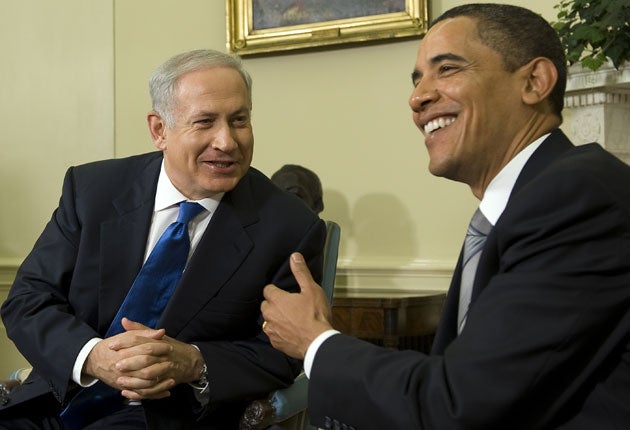Obama's message to Israel: seize this moment
Behind the diplomacy, an uncompromising message from President to Netanyahu

Barack Obama yesterday urged the Israeli Prime Minster, Benjamin Netanyahu, to seize a "historic opportunity" to move towards peace with the Palestinians while resisting pressure from Israel for an "artificial deadline" to resolve the stand-off with Iran over its nuclear ambitions.
Eager to put on a face of friendship, Mr Netanyahu responded by saying that he was ready to negotiate immediately with the Palestinians, but repeated that it would be on the condition that they first clearly state their willingness to recognise Israel as a Jewish state.
There was no mistaking the pressure that Mr Obama was applying to his Israeli guest with such bluntly spoken words delivered before the cameras. "We have seen progress stalled on this front, and I suggested to the Prime Minister that he has a historic opportunity to get a serious movement on this issue during his tenure," President Obama said. "That means all the parties involved have to take seriously obligations that they have previously agreed to." He was also blunt on the illegality of new Israeli settlements. "The settlements have to be stopped," he said.
The Israeli leader came to Washington seeking to underline Israel's concern with Iran and its nuclear programme that he and the West believe is aimed at developing weapons. Mr Obama made clear that the US considers the Iran dossier and the peace process to be linked. Both men indicated that the prospect of a nuclear Iran may have the effect of binding Israel to its Arab neighbours in the search for peace.
"We are prepared to move with the President and with others in the Arab world," Mr Netanyahu said, sitting side by side with Mr Obama, whom he called "a great friend of Israel". He added: "There has never been a time when Arabs and Israelis see a common threat the way we see it today. And we also see the need to join together in working towards peace while simultaneously defending ourselves."
A spokesman for the Palestinian Authority said it had been "encouraged" by President Obama's statements but disappointed by those of Mr Netanyahu. While the Israeli leader stressed that he wanted to see the Palestinians govern themselves, he did not explicitly make mention of a separate state.
It remained unclear last night what concrete commitments either man had extracted from the other, if any. "It's going to be difficult," Mr Obama conceded while voicing his optimism that Mr Netanyahu would "would rise to the occasion". On Iran, Mr Obama indicated that the US would not "foreclose on a range of options" including the imposition of harsh new sanctions. Noting that Iran is preparing for elections, he said only that he hoped to make headway with Tehran before the end of this year, adding: "We're not going to have talks for ever."
On the linkage between the Palestinian and Iranian issues, Mr Obama suggested that achieving peace between Irael and the Palestinians "strengthens our hand in the international community in dealing with the potential Iranian threat".
The summit was the first meeting between the men since they took over as leaders of their respective countries. After beginning the summit with talks in the Oval Office, the pair were joined by senior advisers, including on the US side the special envoy on Middle East peace, the former senator and Northern Ireland peace broker, George Mitchell. No one in Washington underestimates how seriously Israel takes the notion of Iran becoming a nuclear power. They also know that Israel is suspicious of Mr Obama's recent overtures to Iran for diplomatic dialogue.
"There is a sense of urgency on our side," the Israeli leader's national security adviser Uzi Arad affirmed to reporters before the start of the talks. Israel's Foreign Minister, Avigdor Lieberman, recently suggested that the rest of the world should take action to end the Iranian threat by August or Israel would lose patience. The CIA director Leon Panetta last month warned Israel not to surprise the US by taking unilateral military steps.
Mr Obama wants to revive momentum towards peace before travelling to Egypt on 4 June to deliver his much-vaunted speech to the Muslim world. The White House knows progress on a Palestinian state and repairing America's damaged reputation abroad are inextricably linked.
Join our commenting forum
Join thought-provoking conversations, follow other Independent readers and see their replies
Comments
Bookmark popover
Removed from bookmarks